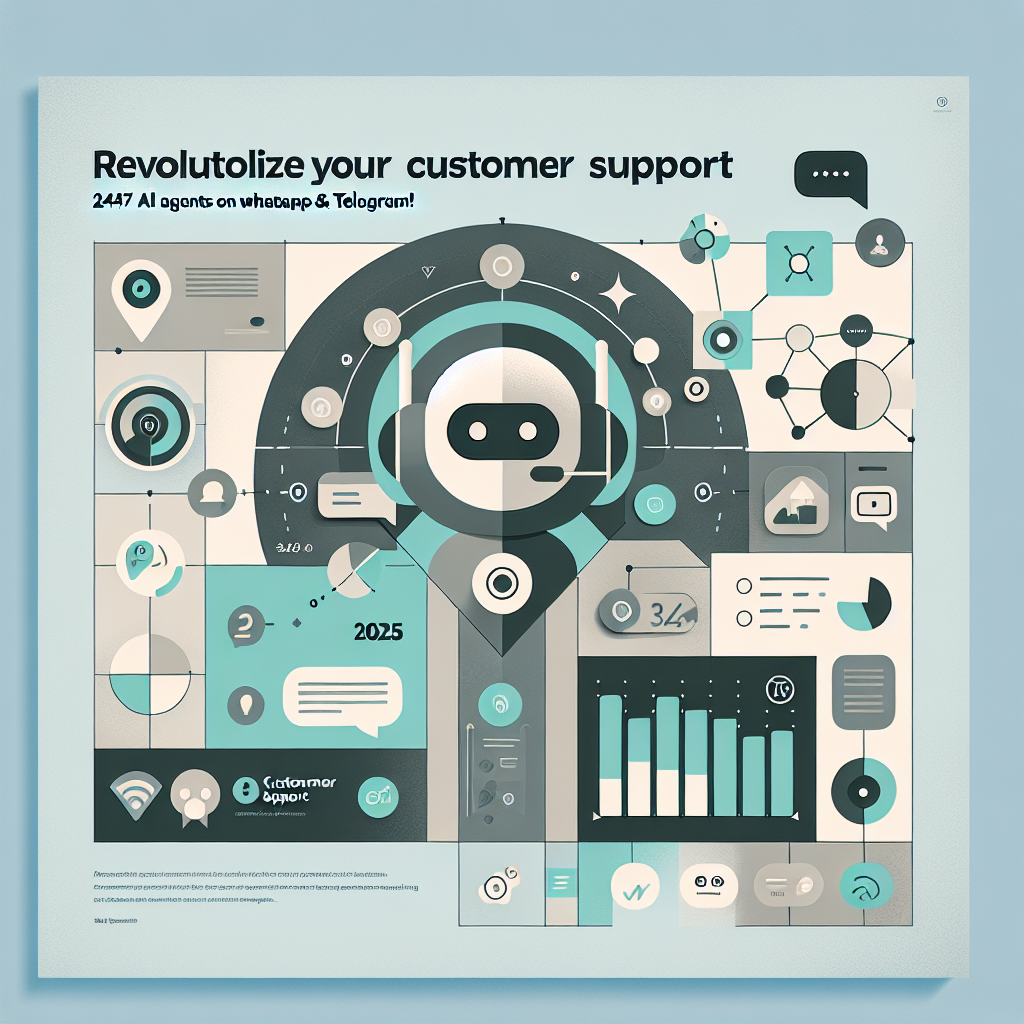“`html
Revolutionize Your Customer Support: 24/7 AI Agents Now on WhatsApp and Telegram
In the fast-moving digital age, customer expectations have evolved. Instant responses and round-the-clock support are no longer optional—they are essentials. Businesses striving to deliver superior customer experience (CX) are increasingly turning to technology, and the adoption of AI-powered solutions is at the forefront. Two platforms stand out as pivotal in the AI customer support revolution: WhatsApp and Telegram. Combining the global popularity of these messaging apps with the intelligence of AI-powered chatbots, brands can now engage customers 24/7, offering seamless, scalable, and personalized support.
The Rise of AI Customer Support
Why AI is Transforming Customer Service
The adoption of AI in customer support has grown exponentially in recent years. AI offers businesses a cost-effective way to handle increasing customer interaction volumes while maintaining, or even enhancing, service quality. AI chatbots can instantly address inquiries, solve common customer problems, and connect users to the right resources.
AI customer support tools are not just about speed; they also bring personalization, multilingual capabilities, and continuous availability, essential for global businesses aiming to deliver exceptional CX.
WhatsApp and Telegram: The Perfect Platforms for Customer Support
WhatsApp and Telegram are two of the world’s most widely used messaging apps, collectively boasting billions of users. These platforms are not just for personal messaging anymore—they are becoming indispensable tools for business communication. WhatsApp Business API and Telegram bots empower businesses to connect with customers on their preferred platforms through AI-driven automation.
Key Benefits of 24/7 AI Agents on WhatsApp and Telegram
1. Around-the-Clock Availability
One of the primary advantages of AI customer support on WhatsApp and Telegram is 24/7 availability. Unlike human agents, AI doesn’t require breaks, weekends, or holidays, ensuring your customers are supported wherever they are, at any time of day.
2. Cost-Efficiency and Scalability
AI chatbots can handle thousands of conversations simultaneously without increasing operational costs. This scalability allows businesses to grow their customer base and support operations without hiring more agents or incurring higher costs.
3. Enhanced Customer Experiences
With AI, every customer interaction can be personalized. AI chatbots analyze customer data and preferences to craft tailored responses, making interactions more meaningful and engaging.
4. Improved Multilingual Support
Both WhatsApp chatbots and Telegram bots can be programmed to support multiple languages. AI tools use natural language processing (NLP) technologies that allow businesses to break linguistic barriers and deliver support in a customer’s preferred language.
How to Implement AI-Powered Chatbots on WhatsApp and Telegram
Step 1: Define Your Use Case
Evaluate what you want the chatbot to achieve. Are you looking to answer FAQs, process orders, conduct surveys, or integrate CRM support? Clear objectives help design a chatbot that aligns closely with your business needs.
Step 2: Choose the Right Platform and Tools
Decide whether WhatsApp, Telegram, or both platforms are suitable for your target audience. Leverage the WhatsApp Business API or Telegram bot framework to begin development. Many third-party providers like ChatGPT, Dialogflow, or Botpress offer tools to create sophisticated conversational bots easily.
Step 3: Develop Your AI Chatbot
Collaborate with chatbot developers to design an intelligent bot experience. Integrate AI models such as NLP to ensure the chatbot understands user queries accurately and reacts contextually.
Step 4: Test and Optimize
Before launching your chatbot, rigorously test it to catch potential issues. Monitor performance post-deployment and optimize the bot based on customer feedback and usage analytics.
Real-World Success Stories
Case Study 1: Retail Giant Boosts Sales with WhatsApp Chatbots
A leading e-commerce retailer integrated AI-driven WhatsApp chatbots to handle customer inquiries about product availability, order tracking, and return policies. The result? A 40% improvement in customer satisfaction and an uptick in repeat purchases.
Case Study 2: Healthcare Provider Reduces Call Center Load via Telegram
Using Telegram bots, a healthcare provider automated appointment booking, symptom checks, and follow-up reminders. This reduced call center load by 60%, allowing human agents to focus on critical cases.
Overcoming Common Challenges with AI Chatbots
Ensuring Chatbots Are Human-Like
AI chatbots need to strike the right balance between automation and a human touch. Employ NLP and machine learning models to improve conversational flow and contextual responses.
Protecting Customer Data
Data security is a priority, especially on platforms like WhatsApp and Telegram. Ensure your chatbot complies with regulations like GDPR and employs secure encryption protocols.
Avoiding Over-Automation
While automation is valuable, certain interactions still require human intervention. Incorporate a handoff feature that escalates complex queries directly to human agents.
Embrace the Future of Customer Support Today
The integration of 24/7 AI customer support on platforms like WhatsApp and Telegram is no longer just a competitive advantage—it’s a necessity. Businesses that adopt this transformative technology gain enhanced efficiency, better customer satisfaction, and an edge in the market. Whether you’re a small startup or a multinational corporation, now is the time to embrace AI customer support and revolutionize your CX strategy. Start your journey today and offer your customers the unparalleled convenience they expect in 2023 and beyond.
“`

